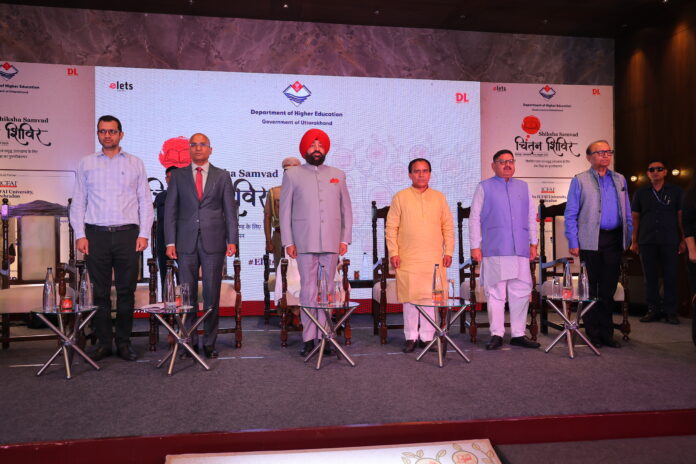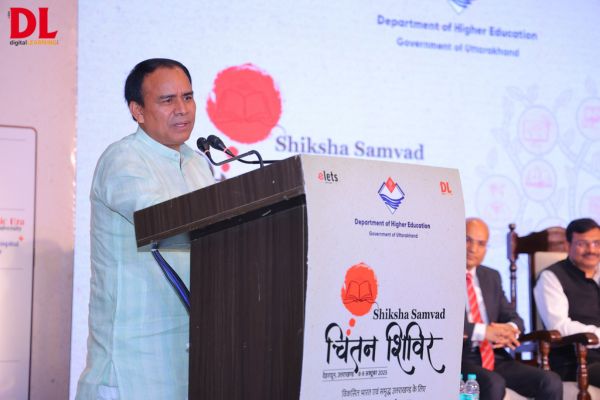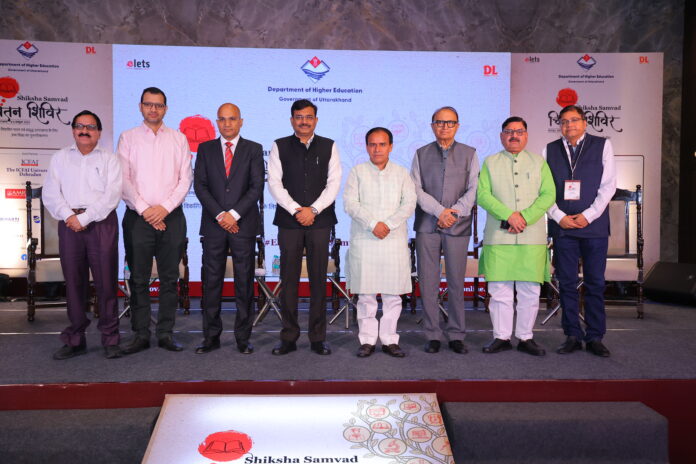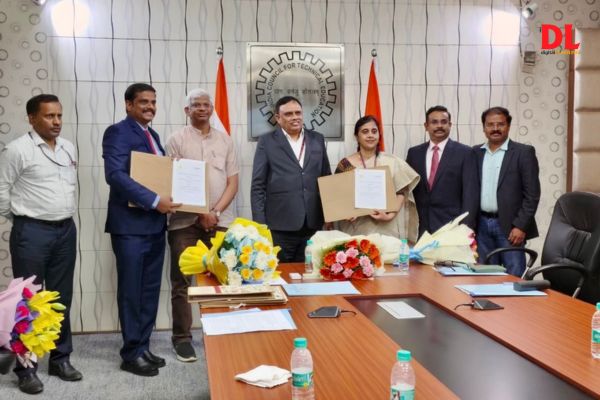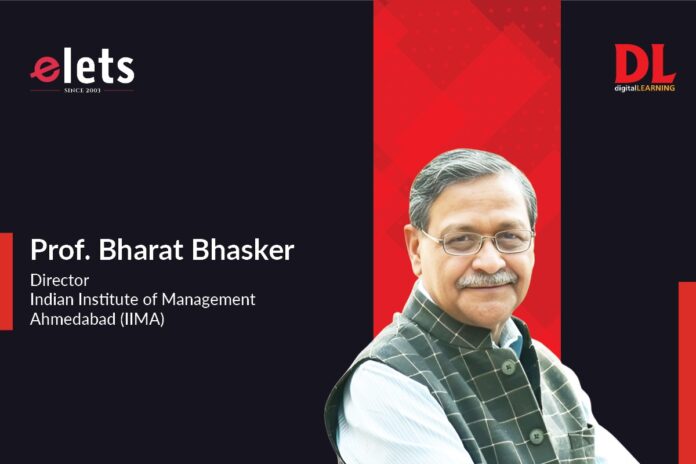We are aware of the fact that we are living in a globalized world, where we welcome the exchange of knowledge across the globe, including foreign universities setting up their off-campus centres with the due approval of the Union Government, as recently seen in Maharashtra, shared Prof. V. Balakista Reddy, Chairman, Telangana State Council of Higher Education (TGCHE), Government of Telangana in an exclusive interaction with Rose Jaiswal of Elets News Network (ENN). Edited excerpts:
The Telangana government is working on a new comprehensive education policy. What are the key pillars of this new policy, particularly concerning higher education, and how do you envision it transforming the landscape of learning in Telangana over the next 5-10 years?
The new comprehensive education policy being crafted by the Telangana government is built on four key pillars:
- Access & Equity
Strengthening public education – from Anganwadis to higher education, through the establishment of semi-residential and English-medium junior colleges, robust fee regulation, and localised admissions based on Intermediate scores to reduce dependence on private coaching.
- Quality & Employability
Focusing on skill-driven curricula and the integration of employability skills into higher education. Input from industry stakeholders will ensure academic relevance. We are committed to providing quality education that is both affordable and accessible to all eligible students.
- Infrastructure & Governance
Establishing an Education Commission to guide reforms, improve infrastructure, recruit staff (including teachers and Vice Chancellors), and strengthen monitoring mechanisms at the mandal level. The Telangana State Council of Higher Education (TGCHE) aims to promote accountability and transparency in education with a forward-looking approach.
- Holistic Development
Promoting value-based, well-rounded learning that emphasizes the arts, humanities, and life skills alongside academics. In pursuit of this goal, various initiatives have been launched, including the signing of MoUs with the Banking, Financial Services & Insurance (BFSI) Consortium, the Bulk Drug Manufacturers Association of India (BDMAI), and NASSCOM. These partnerships will help train students to meet industry demands and equip them with the necessary skills in emerging technologies.
Over the next 5–10 years, this policy is poised to democratise access to quality education, reduce reliance on private coaching, and build a centralized framework for accountability transforming, Telangana’s educational institutions into hubs of excellence and innovation. By aligning education with real-world needs, strengthening governance, and nurturing both academic prowess and ethical citizenship, Telangana aims to produce graduates who are not only globally competitive but also socially conscious and future-ready.
Our vision is to build a knowledge-driven, innovation-led state and an ethically conscious society, with universities acting as catalysts for societal development and economic growth.
The TGCHE recently announced a significant overhaul of the undergraduate curriculum for the 2025-26 academic year, incorporating subjects like AI, cybersecurity, and fintech. What was the driving force behind these specific inclusions, and how will these changes equip Telangana’s graduates for the future job market?
We focus on the following priorities with reference to the New Education Policy, which is poised to shape the future of learning in Telangana.
Firstly, we aim to revise the curriculum to ensure it is industry-relevant, aligning academic content with current and emerging market needs.
Secondly, we place a strong emphasis on skill-building to enhance the employability of students.
Thirdly, the educational approach must provide students with practical exposure through workshops and live projects, enabling them to become familiar with industry requirements.
Fourthly, we are working towards a framework that fosters research and innovation, equipping students to tackle the challenges of the 21st century.
Through the incorporation of cutting-edge subjects directly into degree programs, supported by initiatives such as project-oriented continuous assessments, industrial internships, and faculty development, Telangana seeks to cultivate a workforce that confidently bridges the gap between theoretical knowledge and real-world application.
Graduates will enter the job market with relevant, industry-aligned skills, making them highly competitive in rapidly growing sectors such as Artificial Intelligence (AI), cybersecurity, and financial technology. These subjects are no longer optional, they are foundational.
Our aim is to equip students not just to be employable, but to become future creators. This transformation ensures that graduates from Telangana’s institutions are digitally literate, globally competitive, innovative, and endowed with the leadership skills necessary for corporate governance.
NEP 2020 emphasizes multidisciplinary and holistic education. How is TGCHE facilitating the implementation of these aspects in Telangana’s higher education institutions, and what challenges do you foresee in this transition?
Our suggestions also seek to incorporate the best practices from institutions of higher education across the globe, apart from the guidelines of the NEP 2020, as we seek transformation in higher education to facilitate the establishment of multidisciplinary institutions that offer a wider range of programs.
The TGCHE has constituted various committees consisting of academicians, academic administrators, and industry experts to address the syllabus review in various streams of disciplines and also to revisit the present allocation of credits and the evaluation system. The general consensus is that all the programs must promote flexibility and mobility, wherein the student will have the freedom to choose courses, multiple entry and exit options, and the provision to earn credits through various modes of learning.
It has set up subject-specific committees to revise UG syllabi, allocating about 20–30% of the curriculum to new, cross-cutting themes, integrating technology, research, and internships alongside traditional subjects. To encourage a multidisciplinary outlook, it is inviting input from stakeholders – academicians, industry, policymakers, and launching internships under the Bridge Academia and Industry initiative, offering practical, policy-focused experience in areas like governance, management, and digital transformation.
We also seek to support an ecosystem that nurtures research and innovation by establishing research hubs and centres of excellence through academia-industry tie-ups. Hence, through multidisciplinary and holistic education, we also look forward to seeing the creation of a workforce that is competent enough to address the requirements of the present era. TGCHE is taking proactive steps to facilitate multidisciplinary and holistic education. The TGCHE’s launch of the Telangana Journal of Higher Education with a thematic focus on technology and higher education underscores its commitment to interdisciplinary research and dialogue.
Now, when it comes to the challenges associated with the transition, one of the foremost concerns is the need for a well-trained faculty who are also oriented towards teaching the newly introduced courses. The shift towards a multidisciplinary and flexible academic structure may significantly impact the existing pedagogy and evaluation methods, which can, in turn, lead to resistance from those who prefer to adhere to the traditional system. Another key challenge is the need to bridge the digital divide, ensuring that students from all sections of society have equitable access to learning opportunities in an increasingly technology-driven educational environment. Additionally, we are advising universities to ensure that they possess the requisite infrastructure and that due diligence is exercised while integrating vocational programs within the existing academic framework so that these additions are meaningful, seamless, and aligned with the goals of holistic education.
What are your views on the entry of foreign universities in Telangana in the wake of internationalisation of education?
We are aware of the fact that we are living in a globalized world, where we welcome the exchange of knowledge across the globe, including foreign universities setting up their off-campus centres with the due approval of the Union Government, as recently seen in Maharashtra. Telangana too offers a very conducive environment in terms of good infrastructure, geographical location, industrial hubs, IT landscape, pharmaceutical and manufacturing sectors, and defence industries, which provide ample employment opportunities for students. This economic growth attracts foreign investment and fosters a vibrant ecosystem for research and development, making it an appealing location for universities seeking industry partnerships. The TGCHE has also facilitated the participation of public universities with potential foreign collaborators for establishing off-campus centres and Centres of Excellence.
With the establishment of the Young India Skills University (YISU) and initiatives to integrate industry-relevant skills into curriculum, how is TGCHE actively collaborating with industries to ensure graduates are truly “industry-ready”?
At the very outset, I wish to clarify that the Young Skills University of Telangana (YISU) is established under a public-private partnership and is currently under the supervision of the Department of Industries, Government of Telangana. YISU operates as a public–private partnership with backing from major companies like Apollo, Amazon, Lenskart, AIG, Flipkart, and All Cargo to co-develop curriculum and deliver hands-on training across sectors such as BFSI, healthcare, logistics, and aviation. A standout example is the collaboration with GMR Hyderabad International Airport, where students benefit from aviation-specific training programs, certifications, and real-world exposure to airport operations.
However, as our Honourable Chief Minister has shared his vision to ensure that every graduate student of Telangana is endowed with adequate technical skills, the TGCHE has initiated various moves in this regard. We have signed MoUs with the Bulk Drug Manufacturers Association of India (BDMAI) and NASSCOM, which also envisage jointly developing industry-relevant curriculum and training programs—a significant step towards making our students industry-ready.
The MoU with NASSCOM also facilitates the implementation of a 3-credit, 90-hour ‘Experiential Project-Based Learning’ program for 6th/7th semester engineering students through the FutureSkills Prime platform. It further enables the offering of AI, Gen AI, Cyber Security, IoT, Cloud Computing, and other credit-based courses via the FutureSkills Prime platform. There is also a provision to introduce the Embedded Software Developer and Testing Engineer programs for 7th semester/final year students in hybrid mode.
Our MoU with the Bulk Drug Manufacturers Association of India (BDMAI) seeks to facilitate the development of industry-relevant curriculum and training programs. It will offer skill-building initiatives to enhance the employability of students. Students will benefit from practical exposure provided in pharmaceutical industries through internships, workshops, and live projects in collaboration with industry experts. It will also promote research and innovation to address the demands of the pharmaceutical sector.
Read More: Empowering Educators & Creating Scalable Teacher Training Models
What strategies are being adopted to address the skill gap in emerging technologies, especially AI and data science, and how can academia and industry further strengthen their partnership in this regard?
It is time for collaboration and work towards collective interests since we cannot afford the continuation of the gap between theory and practice.
- Curriculum Alignment with Industry Needs
We seek to address the skill gaps by aligning the curriculum with the needs of the industry to ensure that academic training is relevant and practical.
- Collaborative Research Initiatives
We favour collaborative research initiatives with the active involvement of universities, institutions of higher education, and industries for promoting innovation in AI and data science. This collaboration can harness academic expertise and industry resources to tackle practical challenges.
- Structured Internship Programs
A meticulous plan for internships for students is the need of the hour. Internships play a vital role in bridging the gap between theoretical classroom knowledge and its application in the industry.
- Faculty-Industry Exchange Programs
We must encourage Faculty-Industry Exchange Programs through deputations and workshops to facilitate knowledge sharing and synergise mutual strengths, ensuring that academic programs stay aligned with emerging trends.
- Lifelong Learning and Upskilling
There has to be a strong emphasis on lifelong learning and upskilling by both academia and industry to support continuous skill development for professionals in AI and data science.
How is the TGCHE promoting entrepreneurship and innovation among students, and what support mechanisms are in place to nurture student startups within the higher education ecosystem?
We are interacting with various stakeholders and fostering incubation centers, entrepreneurship cells, and innovation hubs in institutions of higher education, in close partnership with entities like T‑Hub, TASK, and TiE Hyderabad. Our ongoing discussions with various reputed organizations seek to address the integration of technology and digital transformation, while also promoting internships and skill development.
We are exploring fellowship programs for eligible students from Telangana by launching capacity-building initiatives for both students and faculty, and by creating regional innovation clusters and labs, particularly in rural institutions. All the universities under the jurisdiction of TGCHE are in the process of signing individual MoUs with NASSCOM in this regard.
We have also conducted a preliminary study in the rural regions of Telangana to explore the establishment of rural innovation hubs for imparting livelihood and employability skills. Moreover, TGCHE plans to establish research parks, innovation hubs, and incubation centers, with guidance from IIT‑Madras, to provide infrastructure and promote university–industry linkages.
Thus, TGCHE is actively fostering an entrepreneurial ecosystem across campuses. Through Innovation and Incubation Centres, Startup Bootcamps, and support under the IDE (Innovation, Design & Entrepreneurship) framework, we are nurturing student-led ventures. Government schemes like the T-Hub collaboration, seed funding, and mentor networks are being integrated into the higher education system to create job creators, not just job seekers.








